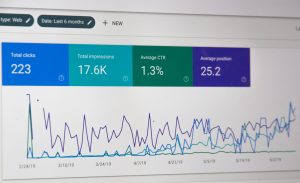Spot Scams Easily: Are The SEO Services Building 100s of Links?

You’ve seen the ads from SEO firms, not trusted ones, saying they’ll build thousands of links for you every month!! The masked rogues sitting behind their monitor are not interested in your SEO success… they just want your money…
And if they get access to your bank account, the horror may begin as they take hundreds of pounds without your consent. Stop there and think before you pay $20 for a bunch of harmful links or just get ripped off with about 10 awful links after ordering many more.
Here are the top 5 reasons why building hundreds of links monthly may not be the best strategy:
- Link Dilution: Excessive linking can dilute the value of your existing links, making them less effective at improving your site’s authority and rankings.
- Link Over-Optimisation: Aggressive linking can raise red flags with search engines, leading to penalties for over-optimization.
- Link Flooding: Building too many links too quickly can appear spammy, causing search engines to flag your site as suspicious.
- Link Expiration: Low-quality links can expire or get removed, causing your link equity to degrade over time.
The Allure of Rapid Link Building
The quest for higher search engine rankings often leads businesses down the path of aggressive link building as opposed to careful digital PR. After all, links are a crucial ranking factor, and the more links a website has, the better it should perform, right?
This oversimplified mindset fuels the temptation to build hundreds, if not thousands, of links every month, with the goal of rapidly boosting a site’s authority and visibility.
This approach is fraught with risks and can ultimately backfire, leading to penalties and a loss of hard-earned rankings caused by buying from rogue link builder services. While link building is undoubtedly important for SEO success, it must be done strategically and with a focus on quality over quantity as you find backlinks for a site.
Blindly pursuing sheer link volume without regard for the nature and relevance of those links can be detrimental to a website’s long-term health and search performance.

- 40% of online businesses close down within 6 months of receiving a Google penalty.
- 30% of websites recover their rankings within a year after receiving a Google penalty.
- During 2024-2023, Google penalised 9% of sites using outdated or inaccurate schema markup
- 10% of Google penalised sites used excessive internal links with keyword-rich anchor text.
Reason 1: It Looks Unnatural to Google
Google’s algorithms are designed to detect and penalise websites that acquire an abnormally large number of new links in a short period. This sudden influx of links appears unnatural and raises red flags, as it deviates from the typical pattern of organic link growth.
Good links improve your site trust flow metric.
Learn why trust flow is important!
But the black hat link builder services won’t tell you that. They just get to make a fast load of big bucks.
When a website builds hundreds of links monthly, it creates a link velocity that is highly unlikely to occur naturally. In the real world, websites earn links gradually over time as they publish high-quality content and gain visibility and authority in their respective niches.
Google understands this natural link acquisition process and has algorithms in place to identify and penalise websites that attempt to manipulate search rankings through aggressive link building tactics. These algorithms analyse various factors, including the rate of link acquisition, the quality and relevance of the linking websites, and the anchor text distribution.
If Google detects a sudden spike in the number of links pointing to a website, it may conclude that the website is engaged in link schemes or other manipulative tactics. This can trigger manual penalties or algorithmic adjustments that can significantly impact the website’s search rankings and organic traffic.
Reason 2: Low-Quality Link Sources
 Photo by Towfiqu barbhuiya on Unsplash
Photo by Towfiqu barbhuiya on Unsplash
The temptation to rapidly build hundreds of links often leads businesses down a dangerous path: utilising low-quality link sources. In the pursuit of quick results, some resort to tactics like link farms, paid links, or other questionable link-building schemes.
However, these methods not only violate Google’s guidelines but can actively harm your website’s rankings.
Link farms are essentially networks of websites created solely for the purpose of exchanging links. These sites typically lack valuable content and exist solely to manipulate search engine rankings. While they may initially appear to boost your link profile, Google’s algorithms are adept at detecting and devaluing these artificial links.
Similarly, paying for links is a clear violation of Google’s guidelines and can result in severe penalties. While the allure of “buying” authority may seem appealing, it’s a short-sighted strategy that puts your website’s rankings at risk. Google values earned links from reputable, relevant sources – not those that are purchased.
Beyond the potential for penalties, low-quality link sources often lack the relevance and authority that search engines value. A link from an irrelevant or spammy website carries little to no weight and may even be seen as a negative signal by Google’s algorithms.
Instead of resorting to these dubious tactics from black hat link builder services, focus on building high-quality links from authoritative, relevant sources. This approach not only aligns with Google’s guidelines but also provides long-term value and credibility for your website as you find backlinks for a site.
Reason 3: Relevance and Authority Issues
Building hundreds of links per month often leads to a lack of relevance and authority in your link sources. Quality links should come from websites that are topically related to your business and have established authority in your industry or niche. Indiscriminate bulk link building makes it nearly impossible to properly vet the relevance and authority of each link source.
Acquiring links from irrelevant or low-authority websites can signal to Google that your content is not valuable or trustworthy. These types of links provide little to no SEO value and may even be seen as an attempt to manipulate search rankings. Google’s algorithms are designed to detect and devalue links from sources that lack topical relevance or authority within your field.
Spend just 10 minutes learning about the value
of well executed SEO campaigns
Furthermore, having a link profile dominated by irrelevant or low-quality links can overshadow the value of any legitimate links you may have earned. This can make it difficult for Google to accurately assess the true authority and relevance of your website within its subject area.
To maximise the SEO impact of your link building efforts, it’s crucial to focus on acquiring links from authoritative, topically relevant sources within your industry or niche. While this approach may yield fewer links per month, the links you do acquire will carry significantly more weight and credibility in Google’s eyes.
Reason 4: Risk of Manual Penalties
 Photo by Amr Taha™ on Unsplash
Photo by Amr Taha™ on Unsplash
Building hundreds of links per month, particularly through aggressive link building tactics like bulk directory submissions or private blog networks, raises a significant risk of triggering manual penalties from Google.
The search engine employs teams of analysts and engineers who manually review websites exhibiting unnatural link patterns or practices that violate Google’s Webmaster Guidelines.
If caught engaging in link schemes or manipulative tactics, sites can face severe consequences ranging from demotion in search results to complete removal from Google’s index. These manual penalties can be devastating, leading to a catastrophic loss of organic traffic and revenue.
Even if a site initially benefits from an influx of low-quality links, the short-term gains are often outweighed by the long-term risks. Google’s algorithms and human reviewers are constantly improving their ability to detect and penalise link manipulation. What may have worked in the past is no guarantee of future success, and the potential fallout from a manual penalty can be difficult and time-consuming to recover from.
Rather than jeopardising their online presence with aggressive link builder services, businesses should prioritise earning high-quality, editorial links through ethical means like creating valuable content, building relationships with industry influencers, and engaging in legitimate marketing and PR activities.
This sustainable approach may be slower, but it aligns with Google’s guidelines and minimises the risk of incurring penalties that could cripple a website’s search visibility.
Reason 5: Wasted Effort and Resources
 Photo by Donald Giannatti on Unsplash[/caption]
Photo by Donald Giannatti on Unsplash[/caption]
Building hundreds of links per month is an incredibly time-consuming and resource-intensive endeavor. It requires a significant investment of time, money, and human effort to identify potential link sources, reach out to webmasters, negotiate link placements, and monitor the success of these campaigns. However, if these links are deemed unnatural or manipulative by Google, all of that effort and investment can go to waste.
Google’s algorithms are highly sophisticated and can detect patterns of excessive, low-quality link building. If your site is flagged for engaging in these practices, the links you’ve built may be devalued or ignored entirely, rendering your efforts fruitless. Even worse, your site could face a manual penalty, which can be devastating for your search engine visibility and organic traffic.
Instead of pouring resources into rapid link builder services tactics that may ultimately be ineffective or even harmful, it’s far more prudent to focus on earning high-quality, relevant links through legitimate means.
This approach may be slower and more challenging, but it’s also more sustainable and less likely to draw scrutiny from search engines.
By creating valuable content, building relationships with industry influencers, and engaging in ethical link-building practices, you can gradually acquire links. This genuinely improves your site’s authority and credibility in the eyes of both users and search engines.
Find backlinks for a site the right way from the start. A Better Approach: Quality Over Quantity
 Photo by Raquel Martínez on Unsplash[/caption]
Photo by Raquel Martínez on Unsplash[/caption]
Instead of building hundreds of low-quality links every month, a sustainable link building strategy focuses on earning high-quality, relevant links over time. This approach involves creating valuable, shareable content that naturally attracts links from authoritative sources within your industry.
Content marketing is a powerful tactic for earning links organically. By producing informative, engaging content like blog posts, whitepapers, infographics, or videos, you can establish your brand as a thought leader and trusted resource. When others find your content useful, they’ll be more likely to link to it from their own websites, blogs, or social media channels.
Influencer outreach is another effective way to earn high-quality links. By collaborating with influential figures in your niche, you can tap into their established audiences and leverage their credibility. This could involve guest posting on their blogs, being featured in interviews or podcasts, or co-creating content that they’ll be motivated to promote and link to.
The reason for link building is to create relationships with related trusted sites and not just to build link volume
Building relationships with industry publications, directories, and resource sites can open up opportunities for earning editorial links or being included in relevant listings or roundups. By consistently creating exceptional content and fostering positive relationships within your community, you’ll naturally attract the kind of high-quality, authoritative links that Google values most.
What has happened to sites engaged in mass link building? Can A Site Recover from Link Penalties?
 Photo by Carlos Muza on Unsplash[/caption]
Photo by Carlos Muza on Unsplash[/caption]
In the world of SEO, there are numerous examples of websites that were initially penalised by Google for engaging in unnatural link building practices, only to recover their rankings and traffic after implementing sustainable link acquisition strategies. You know what should have been done but if this is you, read on.
Here’s a quick typical top SEO mistake that businesses make in their inbound link building campaigns and how a recovery process moves forward. But the whole process of recovery can be avoided early by focusing on authority link building.
The Mistake
An e-commerce website that relies heavily on private blog networks – known as PBNs which are very damaging links – and low-quality directory submissions to artificially inflate their link profile gets hit. After being hit by a manual penalty from Google, the website’s organic traffic plummeted, leading to significant revenue losses.
The Recovery
To rectify the situation, the website’s SEO team has to conduct a comprehensive link audit, identifying and disavowing thousands of low-quality and irrelevant links. They usually then shift their focus towards earning high-quality, editorial links through content marketing, outreach, and strategic partnerships with authoritative industry publications.
The Right Track
Over the course of several months, the website’s rankings will then gradually improve, and organic traffic levels eventually can surpass their pre-penalty levels. This remarkable recovery requires a commitment to adhering to Google’s guidelines and prioritising the acquisition of natural, relevant links from trusted sources.
The website also invests in creating high-quality, newsworthy content and fostering relationships with reputable publications and industry influencers. By earning natural, editorial links from these authoritative sources, the website gradually regains its visibility in search results.
Earning vs. Building Links

The traditional approach to link building often involves actively pursuing and acquiring links through various tactics, such as submitting to directories, commenting on blogs, or even buying links. However, this mindset can lead to a short-sighted and unsustainable link acquisition strategy.
Instead of merely “building” links, the focus should be on “earning” them organically through the creation of high-quality, valuable content and proactive outreach efforts. When you produce truly remarkable and share-worthy content, other websites and influencers in your industry will naturally want to link to it as a credible reference source.
Earning links requires a shift in mindset – from a transactional approach to a more holistic, long-term strategy. It involves consistently creating content that addresses the needs, interests, and pain points of your target audience while positioning your brand as a thought leader and authoritative voice in your niche.
Actively promoting and distributing your content through strategic outreach campaigns can significantly increase its visibility and the likelihood of attracting natural, editorial links from reputable sources.
This could involve reaching out to industry publications, influencers, or relevant websites to showcase your content and potentially secure valuable backlinks.
Earning links may require more effort and patience initially, but the rewards are far more sustainable and valuable in the long run. Not only do earned links carry more weight and credibility in Google’s eyes, but they also foster a genuine, trustworthy relationship with your audience and industry peers – a crucial component of successful online marketing.
Sustainable Link Building Wins! Mass Cheap Link Buying Practices Do Not
 Photo by Jake Ingle on Unsplash
Photo by Jake Ingle on Unsplash
So be a winner! Be that achiever that builds links carefully.
Many businesses succumb to the temptation of rapid, high-volume link building. However, as we’ve explored, this approach is fraught with risks and often counterproductive in the long run. It’s easy then for link builder services selling thousands of links a month for a few dollars to grab your interest.
Google’s algorithms are designed to detect and penalise unnatural link patterns, rendering such efforts futile or even detrimental to your website’s visibility.
A sustainable link building strategy focuses on quality over quantity. It involves earning links through valuable, shareable content, building relationships with industry influencers, and cultivating a strong online presence. While this approach may seem slower, it aligns with Google’s guidelines and fosters organic growth that stands the test of time.
By prioritising relevance, authority, and natural link acquisition, you not only avoid penalties but also establish your website as a trusted, authoritative source in your niche. This enables your web site to lead to increased organic traffic, higher conversion rates, and a stronger online reputation – all of which contribute to long-term success and growth.
Remember, link building is a marathon, not a sprint.
Patience, consistency, and a commitment to quality will ultimately yield far better results than any shortcut or “quick fix” approach. Embrace sustainable link building practices, and your website will be well-positioned to thrive in the ever-evolving digital landscape.



 Photo by
Photo by